
In the context of globalization, reducing food loss and waste has become an important international issue. It not only affects global food security but also impacts the sustainable development of the ecological environment and socio-economic systems. The United Nations Sustainable Development Goal (SDG) 12.3 aims to halve per capita global food waste at the retail and consumer level and reduce food losses along production and supply chains (including post-harvest losses) by 2030, serving as a guide for global efforts against food waste.
Establishing a sustainable food production and consumption system and reducing food waste play a crucial role in addressing climate change, protecting biodiversity, and promoting sustainable social development. China has introduced a series of robust policies and regulations in recent years to reduce food waste. Additionally, there has been a continuous advocacy for civilized, healthy, rational, and green consumption within society.
Led by the Shenzhen One Planet Foundation (OPF) and its strategic partner World Wide Fund for Nature (WWF) Beijing Office and supported by Rare Europe, and Rare China Center for Behavior, the EU SWITCH-Asia Pride on Our Plates project aims to assist China's MSMEs in the catering industry to tackle food waste reduction. The project has recently released a Report on Implementation of Food Waste Reduction Policy in Chinese Catering Industry and Pilot Cities Case Sharing in April, 2024. It aims to provide practical experience and clear guidance for policy formulation and implementation, and for catering enterprises to reduce food waste in their operations and management. The Report furthermore seeks to explore effective paths to transform theory into practice and to implement policies on a practical level for government departments and the industry. This article showcases the efforts made by the Chinese government and the catering industry to reduce food waste from policies, pilot city cases, and the perspectives of catering enterprises.
Policy Support
In April 2021, China legislated its first anti-food waste law, the Anti-food Waste Law of the People's Republic of China , and subsequently introduced the Action Plan for Food Saving and the Anti-Food Waste Work Plan in the same year. In 2023, three recommendatory national standards were released, including the Specification for Quality Management of Catering Enterprise, the General Rules for Management of Anti-food Waste in Catering, and the Guidelines for Preventing Food Waste in Party and Government Organs.
Guided by the national laws, actions and standards, regulations and policies promoting food waste reduction have been integrated into various relevant fields, such as food safety, health and hygiene, environmental protection, among others.
As of November 2023, the team that has worked on the compilation of the Report has collected a total of 330 relevant policies, including 216 anti-food waste special policies, and 114 related policies in other fields incorporating food waste reduction.
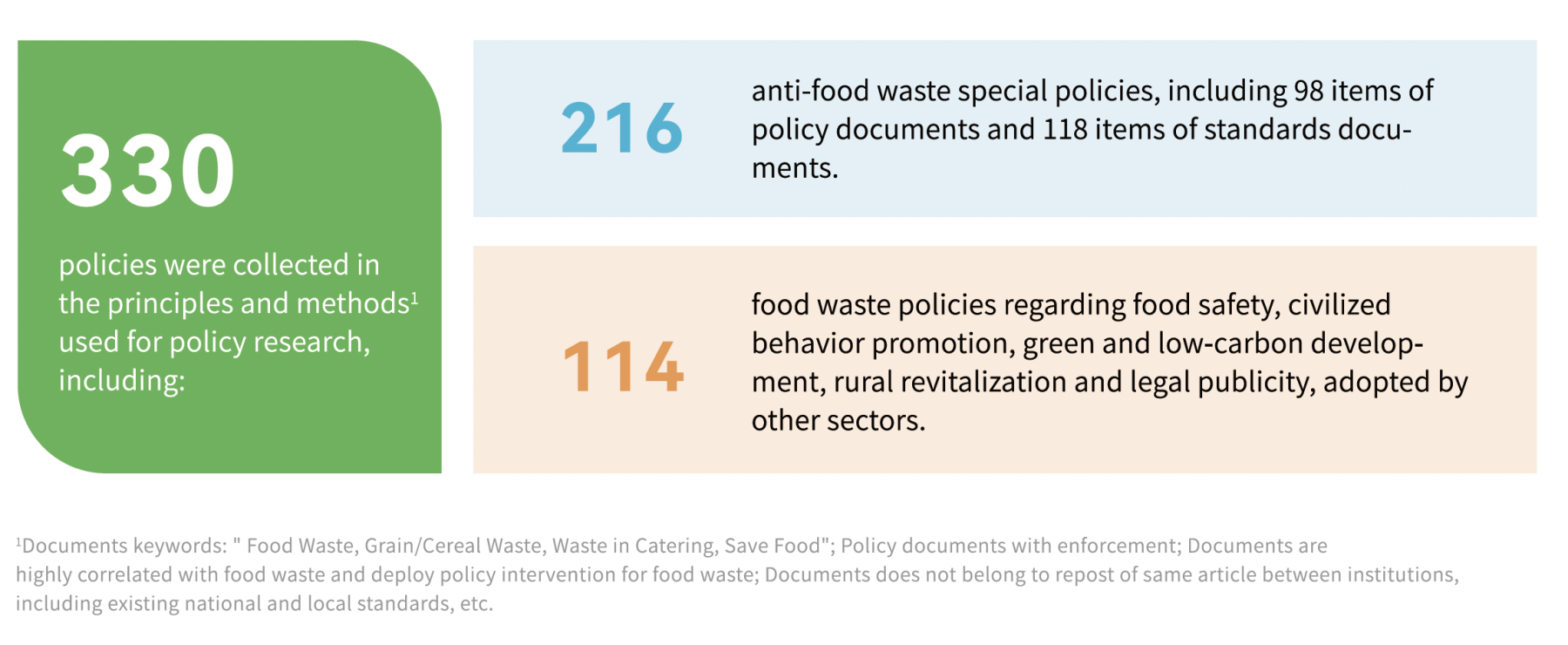
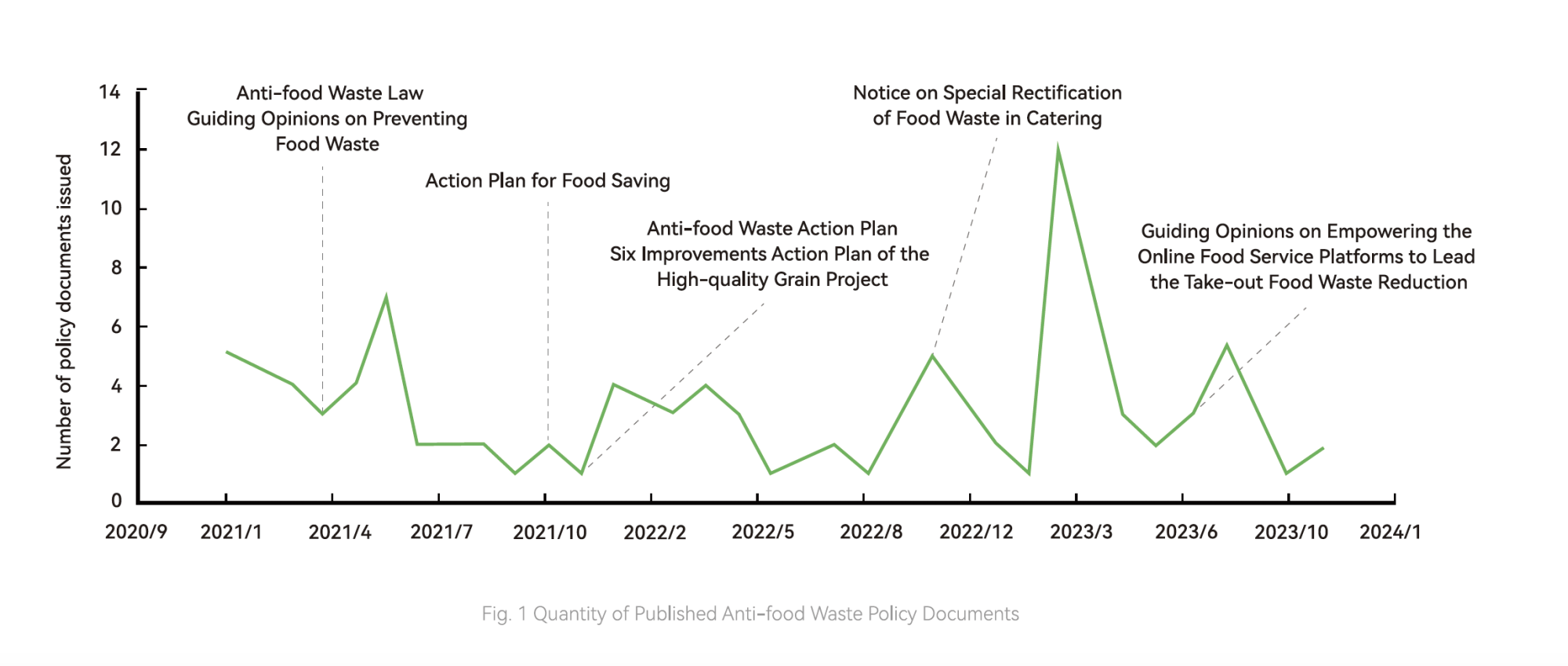
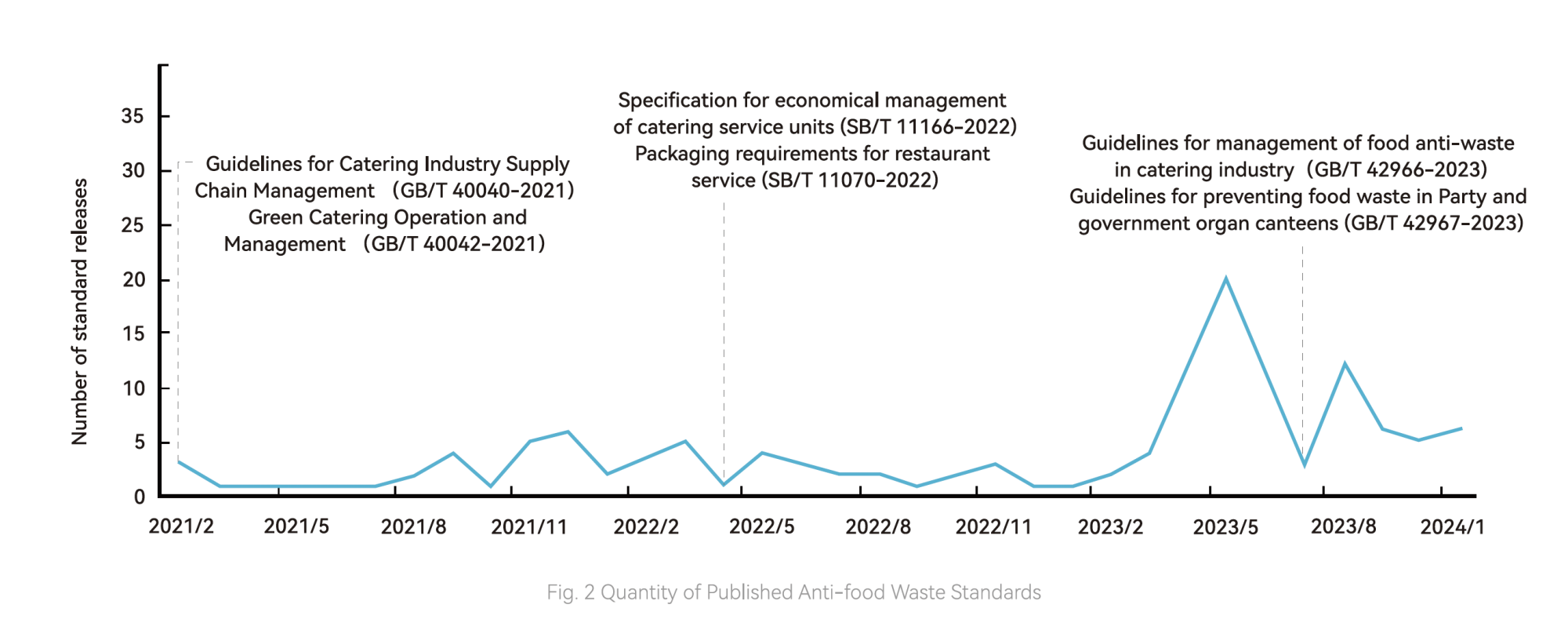
27 provinces (and municipalities directly under the Central Government) and 30 prefecture-level cities issued special policies on anti-food waste for the catering industry within approximately three years (from January 2021 to November 2023). These policies were mostly promulgated in the form of laws, regulations, implementation plans, and special actions.
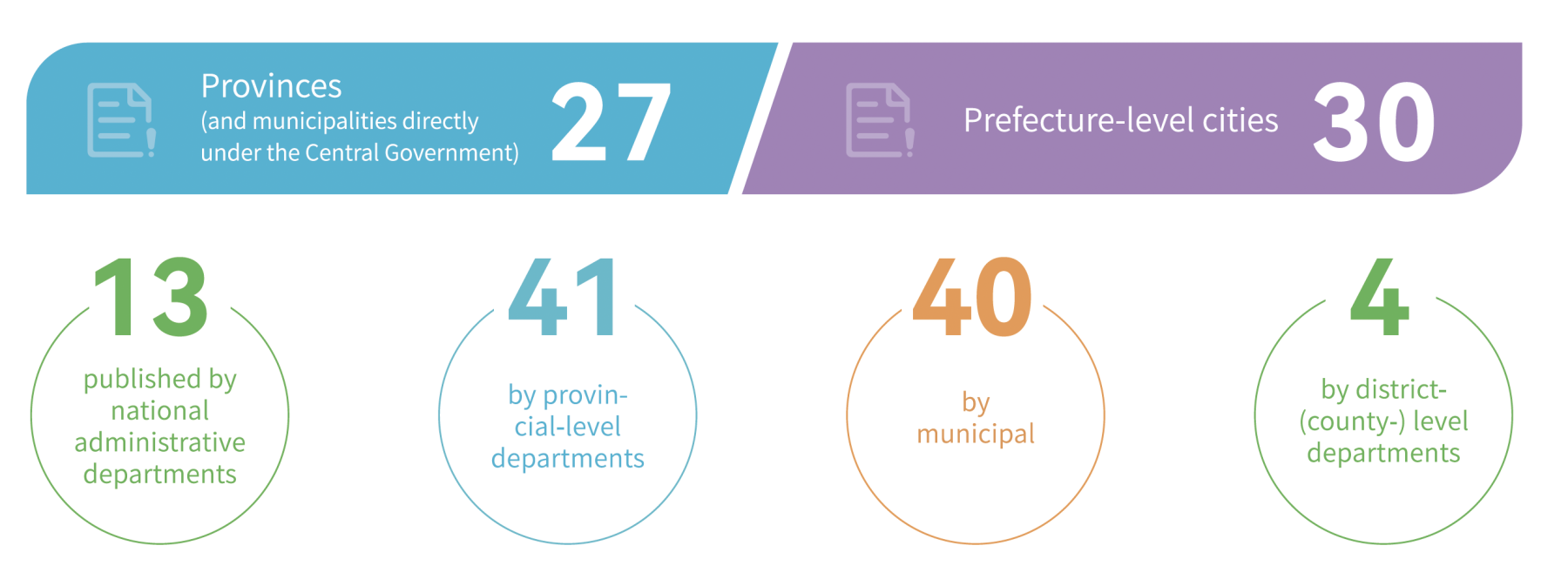
Moreover, the responsible authority bodies for the policies are diverse, including government departments, industry associations and civil societies, the national or local market regulation administrations, commercial authorities, development and reform commissions, food and strategic reserves administrations, general offices of local governments, among others. The formulation and implementation of these regulations, policies, and standards provide strong guarantees for preventing and curbing food waste behavior.

Pilot City Experiences
As a highlight of the Report, the Pride on Our Plates project selected Beijing, Hangzhou, Shanghai, Shenzhen, Sanya, and Kunming as pilot cities to summarize their experiences in policy formulation and implementation. Each pilot city has localized working pathways that suits their city characteristics to better tackle food waste.
Hangzhou
Named the "First City of Digital Economy," Hangzhou has strengthened publicity, reinforced supervision, and combined rewards and punishments under various policies. It has utilized technological advantages to promote behavior change, such as applying "White and Black List" management system to catering industry, publishing "White and Black List" on government websites and WeChat accounts to encourage positive consumer behavior. For example, the restaurants were encouraged to install the "infrared loudspeaker" at their entrance to play audio messages that remind customers to avoid waste and order appropriately. Additionally, existing cameras with loudspeakers, intelligently managing the online catering services, are used to periodically broadcast anti-food waste regulations. These methods enhanced consumer awareness both online and offline.
Hangzhou has also taken concrete steps in the level of regulation. For instance, it has imposed administrative penalties on businesses that engage in practices likely leading to food waste, such as bundling small portions of popcorn/fries with drinks, which can mislead or induce consumers to order more than necessary. A cinema was warned for such behavior.
Shenzhen
Shenzhen leverages technology to reduce waste from the origin. For instance, canteens use data analysis understanding the users’ favorite foods and purchase ingredients not by experience, so as to avoid ingredient waste and realize "zero inventory”. Additionally, Shenzhen promotes food donations to reduce waste and support those in need by collecting uneaten food within a certain duration and storing it in refrigerators for citizens to take for free. Measures such as the "Small Portion Meal" activities are part of the "Ten Actions to Prevent Food Waste in Catering", fostering a social environment of “living a thrifty life”. Furthermore, improper marketing practices, such as restaurants encouraging customers to order excessively through “Challenge for Free” promotion activities, are regulated, with administrative penalties imposed to promote waste reduction in operations.
Beijing employs multiple measures, using legal provisions as rigid constraints and introducing various supporting standards. Shanghai focuses on food waste reduction from the origin, promoting prioritizing food saving task. Sanya targets the tourism industry, implementing precise waste reduction measures and strong regulatory enforcement. Kunming intensifies MSMEs’management, regulating catering industry with multiple standards.
Enterprise Practices
An online study involving 556 catering enterprises reveals that the publicity of anti-food waste policies has been strengthened, and training on reducing food waste has generated good effects. However, the policy publicity and implementation led by governmental authorities for multiple main bodies through multiple media channels need to be carried out in an all-round manner, especially the publicity and training for small and medium-sized enterprises need to be increased.
For example, 67% of the participating enterprises support incorporating "food waste performance" into the rating or credit assessment process, although a small proportion remains cautious. 56% of catering enterprises believe there is a need to strengthen training on "food saving and food waste reduction", with 34% indicating an urgent need for technical training. Moreover, various waste reduction measures need further promotion to ensure concepts like "precise purchase" are effectively applied.
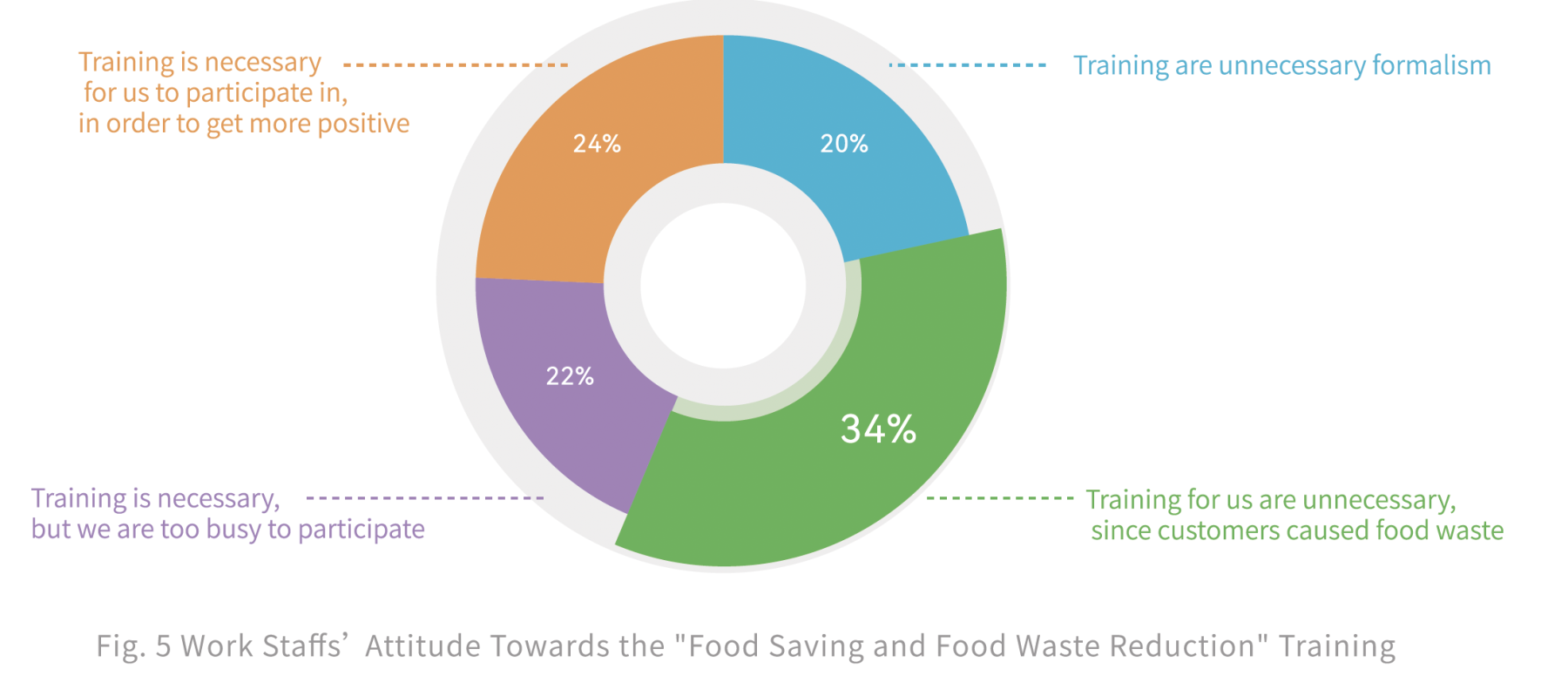
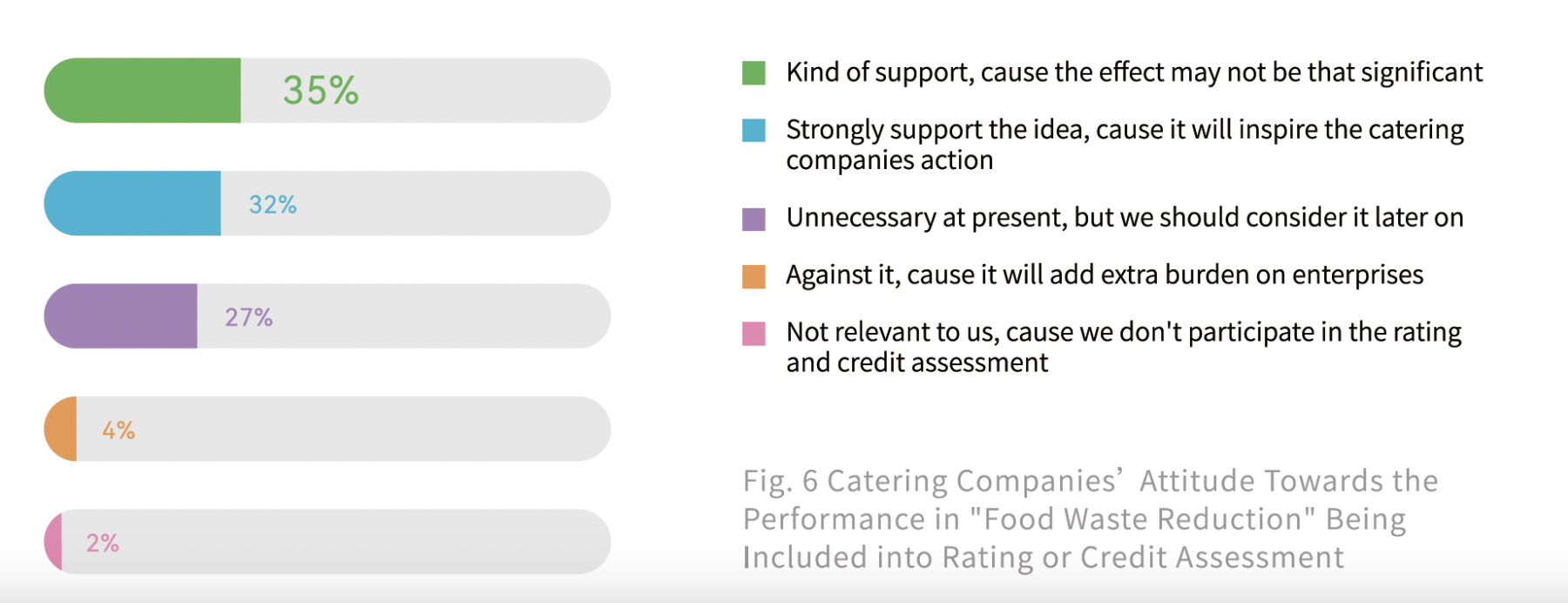
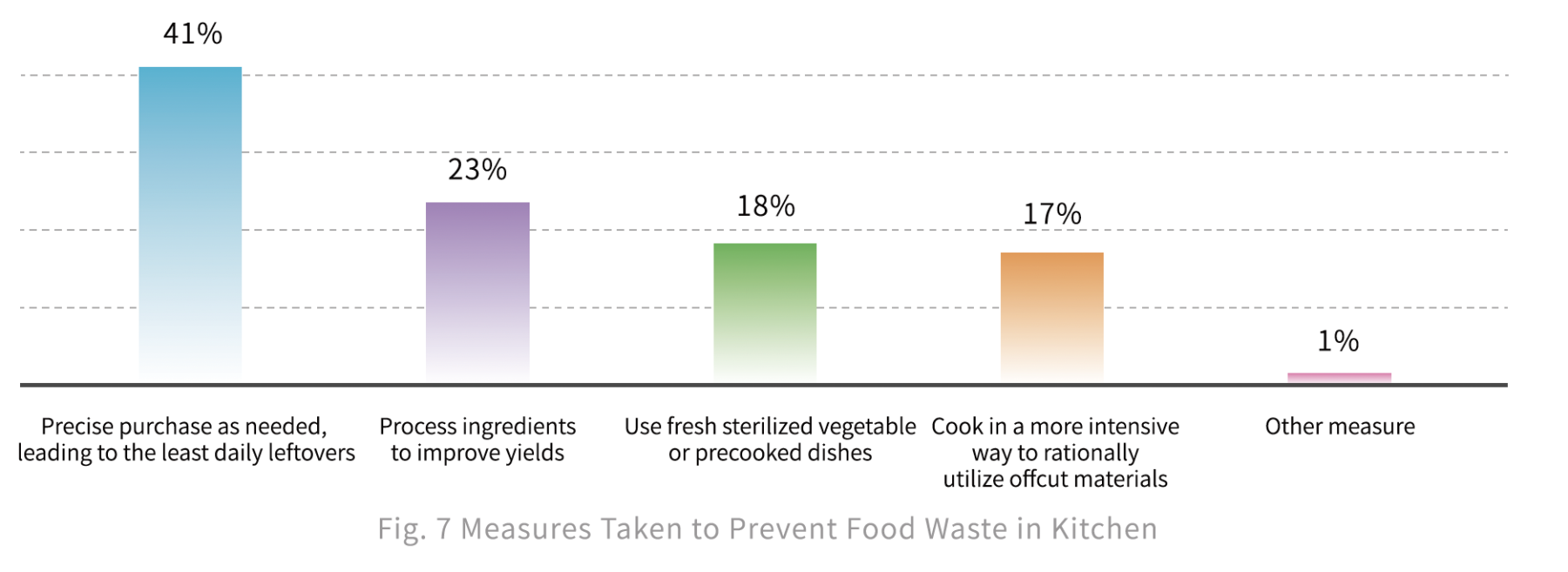
In the global trend of establishing a sustainable food system, advocating and practicing food waste reduction is both a necessity and a significant social endeavor. Currently, the catering industry in China faces various technical and management challenges in reducing food waste. These include categorizing, monitoring, and measuring food waste, establishing multi-stakeholder coordination mechanism and efficient multi-main body anti-food waste regulating system.
Recommendations:
1. Defining the main bodies’ responsibilities and building the long-term anti-food waste mechanism: Responsibilities should be clearly defined from national level to regional level among different departments to build information exchange platforms to form an effective linkage mechanism for comprehensive guidance, scientific management, and precise governance.
2. Improving standard specifications and building an anti-food waste guideline: Firstly, to strengthen promotion and trainings of national standards; secondly, to accelerate the establishment, amendment and trainings of local standards; and thirdly, to further develop specifications for standards.
3. Building a diversified management model through administrative agreements: A community model of "risk-sharing" and "interest-sharing" between the government and society shall be established to specify an administrative reward and punishment mechanism.
4. Improving data and promoting quantitative monitoring and measurement of food waste: A monitoring and assessment system shall be built to monitor and measure the food loss and waste throughout the supply chain, and to comprehensively learn about the actual food waste in the whole food system.
5. Launching demonstration and pilot projects to generate duplicable and promotable experience: For instance, fresh products should be sold in places of origin or in neighboring area, to reduce food loss caused by long-distance transportation.
6. Building price incentive mechanisms to restrain inappropriate operations: For example, a rational charging standard for non-household kitchen waste shall be developed to further improve the kitchen waste collection, transportation and disposal mechanism.
7. Strengthening publicity and education to guide people towards the green and low-carbon lifestyle: For instance, a transition from “extravagance” to “health, thriftiness and civilization”.
8. Conducting studies on SDGs of food loss and waste and developing China’s action plan: All relevant parties, including the government departments and associations, hospitality enterprises, retailers and farmers in different sectors, shall be motivated to actively participate in the program, setting specific targets, and developing guidance on food waste reduction actions for the supply chain and consumers.
More information: https://www.wwf-opf.org.cn/news/2187



